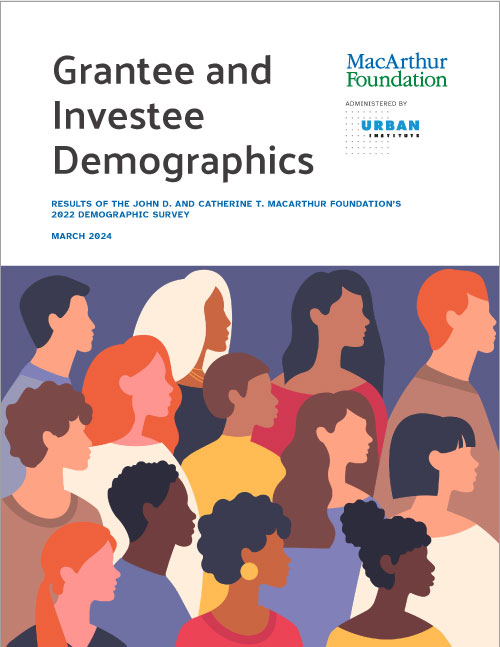The results of a recent demographic survey of our U.S.-based grantees and impact investees are helping us continue to learn and align our work with our values.
MacArthur began collecting demographic data from our U.S.-based grantees and impact investees in 2019, and in 2022, we launched our second demographic survey. Today, we are sharing the results of that survey. The findings will help us continue to learn; better understand the organizations we fund; and align our grantmaking and impact investments with our values and the Just Imperative.
Survey Results
Fifty-four percent of the nearly 600 organizations invited to participate in the survey responded. The Urban Institute, which partnered with MacArthur to administer the survey and conduct data analysis, found that:
- 39 percent of organizations described themselves as centering people of color.
- Data collection on the LGBTQ+ community and disability status, is less common among our grantees and investees than data collection on sex/gender and race/ethnicity.
- 50 percent of grantees’ board members identified as male/men, while 42 percent identified as female/women.
- The majority of heads of organizations, senior management, and staff identified as female/women.
- 50 percent or more of board members, and staff at all levels identified as White.
- General operating support grantees were more likely to respond to our survey than organizations that had only received project or program support grants.
 To make participation easier for grantees and investees, we accepted data in multiple formats. As an alternative to completing our survey, organizations could submit their data by sharing their Candid profile or they could link to existing demographic data on their website or in a document. This was a departure from our first survey in 2019. One of our aspirations is to ensure that the processes we use with grantees and impact investees are equitable and not arduous. Supporting philanthropy’s shift toward using common data sources in place of unique surveys is in line with this goal.
To make participation easier for grantees and investees, we accepted data in multiple formats. As an alternative to completing our survey, organizations could submit their data by sharing their Candid profile or they could link to existing demographic data on their website or in a document. This was a departure from our first survey in 2019. One of our aspirations is to ensure that the processes we use with grantees and impact investees are equitable and not arduous. Supporting philanthropy’s shift toward using common data sources in place of unique surveys is in line with this goal.
We believe that this data is meaningful in holding MacArthur accountable to our Just Imperative goals of ending practices that perpetuate racism and disparities.
While we are eager to look for trends, we are not comparing data between our demographic surveys. Our data collection methods in 2019 anonymized respondents’ identities, and in 2022, they did not. This made the two data sets too different to allow for direct comparison. Still, we believe that this data is meaningful in holding MacArthur accountable to our Just Imperative goals of ending practices that perpetuate racism and disparities. We are grateful to all the organizations that took the time to submit their data.
In the coming months, we will share our rationale for collecting and using demographic data. It is our hope that we can further reduce the burden on grantees and investees and better coordinate with other peers in the field, while supporting our desire to fund diversely staffed organizations that represent the communities they serve and issues they seek to address.
Explore our staff demographics dashboard to learn more about the demographics of MacArthur’s Board and Staff.
Stay Informed



